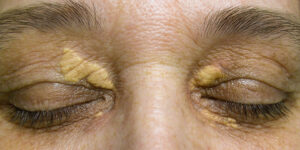Skin Signals Used to Diagnose Serious Diseases!

In a groundbreaking discovery, researchers have found that the skin can serve as a crucial diagnostic tool for identifying and treating serious diseases. Beyond the cosmetic concerns of skin issues like acne, a myriad of skin signals can indicate underlying and potentially life-threatening disorders. While this information is for educational purposes only and not intended as medical advice, it highlights the importance of paying attention to our skin’s messages and seeking professional healthcare guidance.
Dark spots on the skin, for instance, might be an indication of adrenal insufficiency, also known as Addison’s disease. However, it is essential to remember that dark spots alone do not necessarily point to this condition. Accompanying symptoms, such as muscle and joint pain, loss of appetite, low blood pressure, and abnormal blood sugar levels, should prompt immediate consultation with a medical professional.
Another skin disorder to be mindful of is vitiligo, which manifests as white patches on the skin. This condition occurs when melanocytes, the cells responsible for producing skin pigment, stop functioning correctly. Consulting with an endocrinologist or dermatologist can lead to an accurate diagnosis and appropriate treatment.
Persistent and severe rashes should never be ignored, as they could signify underlying health issues. Rashes triggered by food, medications, or infections like chickenpox should be examined by a doctor. Certain rashes, like those associated with Stevens-Johnson syndrome or Lyell’s syndrome, can even be life-threatening, warranting immediate medical attention.
If you experience recurring edemas (swelling), it might be an indication of hypothyroidism, a condition where the thyroid gland fails to produce adequate hormones. Symptoms like dry skin, hair loss, and weight gain may accompany this condition, necessitating a visit to an endocrinologist.
While most moles are harmless, rapid growth, pain, or changes in color and size should be examined by a medical professional. These alterations could be indicative of a more serious issue.
Flaking skin can be attributed to various factors, including vitamin deficiencies, hormonal imbalances, allergies, or underlying diseases. Severe symptoms accompanying flaking may be a sign of a critical underlying condition.
Excessive sweating may indicate Graves’ disease, an autoimmune disorder affecting the thyroid gland. Besides excessive sweating, thinner skin and chronic itching can accompany this condition, making medical consultation imperative.
Overall, recognizing and interpreting skin signals can play a vital role in diagnosing and treating potentially dangerous diseases. However, it is crucial to remember that this information is not a substitute for professional medical advice. Seeking prompt attention from healthcare experts when observing concerning skin signals can lead to timely treatment and improved outcomes.




